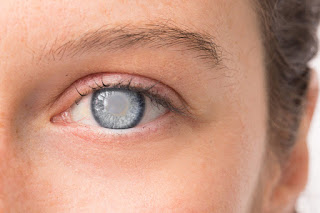What Should I Know about Cataracts?
Cataracts are changes in clarity of the natural lens inside the eye that gradually degrade visual quality. The natural lens sits behind the colored part of the eye (iris) in the area of the pupil, and cannot be directly seen with the naked eye unless it becomes extremely cloudy. The lens plays a crucial role in focusing unimpeded light on the retina at the back of the eye. The retina transforms light to a neurologic signal that the brain interprets as vision. Significant cataracts block and distort light passing through the lens, causing visual symptoms and complaints.
Cataract development is usually a gradual process of normal aging, but can occasionally occur rapidly. Many people are unaware that they have cataracts because the changes in their vision have been so gradual. Cataracts commonly affect both eyes, but it is not uncommon for cataracts in one eye to advance more rapidly. Cataracts are very common.
Experts have estimated that visual disability associated with cataracts accounts for over 8 million physician office visits a year in the United States. This number will likely continue to increase as the proportion of people over the age of 60 rises.
When people develop cataracts, they begin to have difficulty doing activities they need to do for daily living or for enjoyment. Some of the most common complaints include difficulty driving at night, reading, participating in sports such as golfing, or traveling to unfamiliar areas.
The term cataract is derived from the Greek word cataractos, which describes rapidly running water. When water is turbulent, it is transformed from a clear medium to white and cloudy. Keen ancient Greek observers noticed similar-appearing changes in the eye and attributed visual loss from "cataracts" as an accumulation of this turbulent fluid, having no knowledge of the anatomy of the eye or the status or importance of the lens.
Cataract Symptoms
Having cataracts is often compared to looking through a foggy windshield of a car or through the dirty lens of a camera. Cataracts may cause a variety of complaints and visual changes, including blurred vision, difficulty with glare (often with bright sun or automobile headlights while driving at night), dulled color vision, increased nearsightedness accompanied by frequent changes in eyeglass prescription, and occasionally double vision in one eye. Some people notice a phenomenon called "second sight" in which one's reading vision improves as a result of their increased nearsightedness from swelling of the cataract. A change in glasses may help initially once vision begins to change from cataracts; however, as cataracts continue to progress and opacify, vision becomes cloudy and stronger glasses or contact lenses will no longer improve sight.
Cataracts are usually gradual and usually not painful or associated with any eye redness or other symptoms unless they become extremely advanced. Rapid and/or painful changes in vision are suspicious for other eye diseases and should be evaluated by an eye-care professional.
Cataract Causes
The lens is made mostly of water and protein. Specific proteins within the lens are responsible for maintaining its clarity. Over many years, the structures of these lens proteins are altered, ultimately leading to a gradual clouding of the lens. Rarely, cataracts can present at birth or in early childhood as a result of hereditary enzyme defects, and severe trauma to the eye, eye surgery, or intraocular inflammation can also cause cataracts to occur earlier in life. Other factors that may lead to development of cataracts at an earlier age include excessive ultraviolet-light exposure, diabetes, smoking, or the use of certain medications, such as oral, topical, or inhaled steroids. Other medications that are more weakly associated with cataracts include the long-term use of statins and phenothiazines.
Dr. Birendra Jha is one of the Best Cataract surgeon in Indore, He treats diseases related to the eyes. Dr. Birendra Jha has been doing squint surgery, Glaucoma, Pediatric Ophthalmology, Lasik eye surgery in Indore at Indore India Eye Care. If you are looking for the Best Squint specialist in Indore, contact to Dr. Birendra Jha. Book an Appointment today call us now +91-9977141260, visit on online website - https://www.indoreindiaeyecare.com/
Online Book an Appointment today:- https://www.indoreindiaeyecare.com/contact-us.html
Please go through our social media :
like our page to know more about eye
Facebook :- https://www.facebook.com/eyeclinicsinIndore/
Please do follow on Instagram
Instagram :- https://www.instagram.com/indoreindiaeyecare_/
To More Post: - What Is the Medical Treatment for Glaucoma?




Comments
Post a Comment